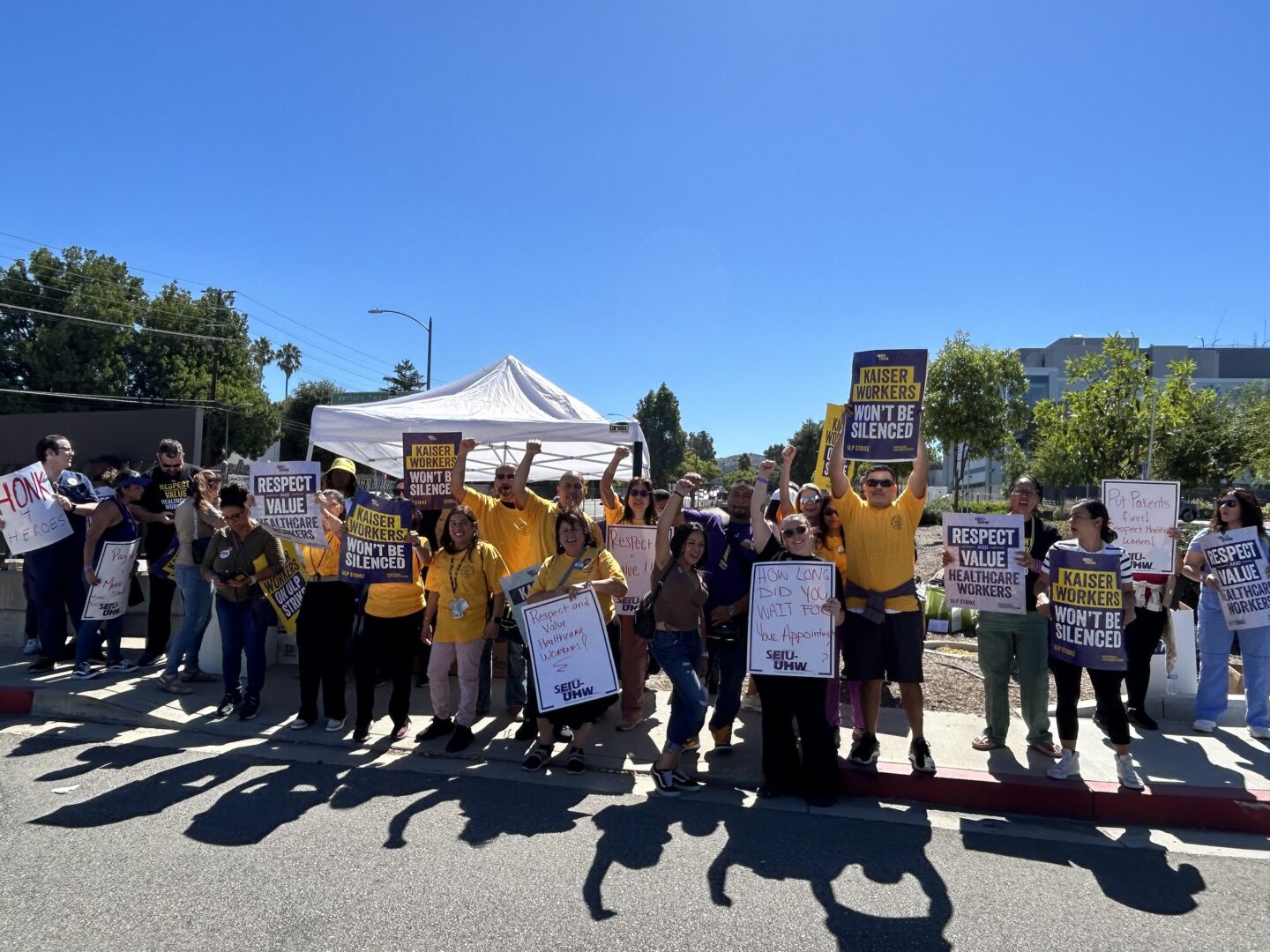 View Winners →
View Winners → 
SEIU-UHW members on strike. | Photo courtesy of ufcw770 CC BY 2.0 DEED
Thousands of Kaiser Permanente health care workers in Southern California and beyond returned to the picket lines Friday for the final day of a three-day strike billed as the largest of its type in U.S. history.
According to the Coalition of Kaiser Permanente Unions, striking workers are planning to return to work at 6 a.m. Saturday.
However, union officials said they may issue a 10-day strike notice on Saturday, potentially setting the stage for further walkouts if a contract agreement is not reached.
Kaiser officials said the next “large, in-person bargaining session” is scheduled for next Thursday, although in the meantime, “committees and local bargaining teams representing both sides will continue to meet.”
A representative for Kaiser said in a statement Friday morning that most procedures were not delayed by the strike, and contingency plans were in place to minimize disruptions.
“We are fortunate that most procedures were not delayed or deferred, most routine surgeries were not rescheduled and our ambulatory appointment access has been close to normal, in part because we expanded access just prior to the visit and converted many appointments to phone and video. Kaiser Permanente remains committed to reaching an agreement that is good for our employees, our members, and our organization, and we will continue to bargain in good faith with our Coalition partners,” according to Kaiser.
The workers’ contract expired Saturday, but bargaining continued over the weekend and again Monday, Tuesday and through the night into Wednesday, to no avail. The strike began at 6 a.m. Wednesday.
“Now more than ever Kaiser Permanente needs to retain and attract qualified healthcare professionals. Outsourcing and subcontracting would have the opposite effect,” Kathleen Coleman, a medical assistant at Arapahoe Primary Care in Colorado, said in a statement released by the union Friday.
An estimated 75,000 Kaiser workers were taking part in the strike, according to the Coalition of Kaiser Permanente Unions. In addition to California, picketing took place in Colorado, Washington, Oregon, Virginia and Washington, D.C.
The coalition has been pushing for higher wages commensurate with inflation, increased staffing and working conditions. The unions have also repeatedly accused Kaiser of bad-faith negotiating, an allegation Kaiser has denied.
“At issue, health care workers say, are a series of unfair labor practices related to bargaining in bad faith, along with simmering staff concerns related to unsafe staffing levels that can lead to dangerously long wait times, mistaken diagnosis, and neglect,” according to an earlier union statement. “After years of the COVID pandemic and chronic understaffing, Kaiser healthcare workers are calling on management to provide safe staffing levels.”
The union has also accused Kaiser of cutting performance bonuses for employees, failing to protect employees against subcontracting and offering wages that fail to keep pace with inflation — all issues that Kaiser has refuted.
“Frontline health care workers are awaiting a meaningful response from Kaiser executives regarding some of our key priorities including safe staffing, outsourcing protections for incumbent healthcare workers, and fair wages to reduce turnover,” Caroline Lucas of the Coalition of Kaiser Permanente Unions said in a statement. “Health care workers within the coalition remain ready to meet at any time. Currently, the strike continues, and there are no sessions scheduled at this hour.”
Kaiser officials said the most recent bargaining sessions did result in a “number of tentative agreements,” and they insisted the health care system’s latest offers address the union’s demands. Kaiser officials said the company is offering:
- “across-the-board” wage increases in all markets over four years;
- an improved Performance Sharing Plan with the potential for payouts of up to $3,750;
- minimum wages of $23 an hour in California and $21 an hour in other markets; and
- renewal of tuition assistance and training programs.
“We remain committed to reaching a new agreement that continues to provide our employees with market-leading wages, excellent benefits, generous retirement income plans, and valuable professional development opportunities,” according to Kaiser.
The company also affirmed its commitment to hiring, confirming that it has already reached a goal of hiring 10,000 new union-represented employees before the end of the year.
“In total over the past two years, Kaiser Permanente has hired more than 50,000 people to join our teams,” according to the company.
On Wednesday, Kaiser officials issued a statement saying rising inflation has led to a “massive surge” in expenses, and has made it tough for the company to balance taking care of its employees with being affordable to patients.
“As noted in a recent report from the American Hospital Association, rising inflation has led to health care experiencing a `massive surge’ in expenses driven by drugs and supplies, equipment shortages, staffing costs and supply chain disruptions,” Kaiser officials said. “At the same time, in the wake of the pandemic, demand for care has increased dramatically, as people come in for care that has been delayed. Kaiser Permanente is not immune to these inflationary pressures.”
Among the workers involved in the strike are licensed vocational nurses, emergency department technicians, radiology technicians, ultrasound sonographers, teleservice representatives, respiratory therapists, X-ray technicians, certified nursing assistants, dietary services, behavioral health workers, surgical technicians, pharmacy technicians, transporters, home health aides, phlebotomists and medical assistants, union officials said.




































































































